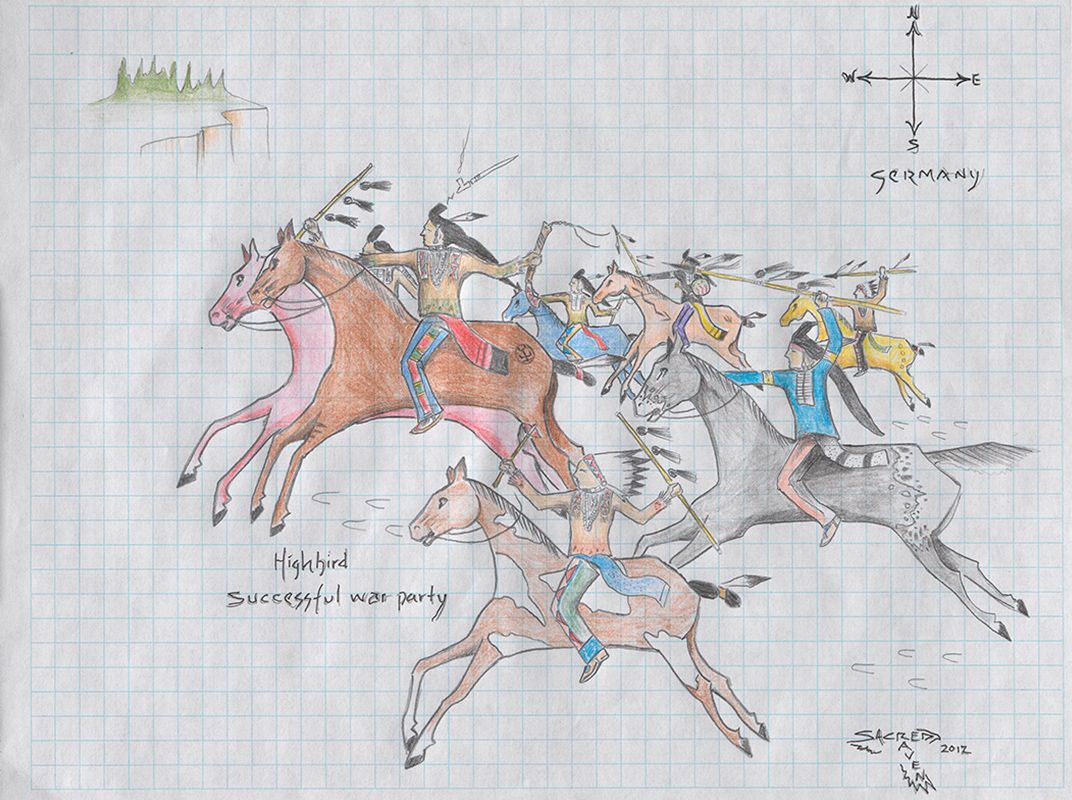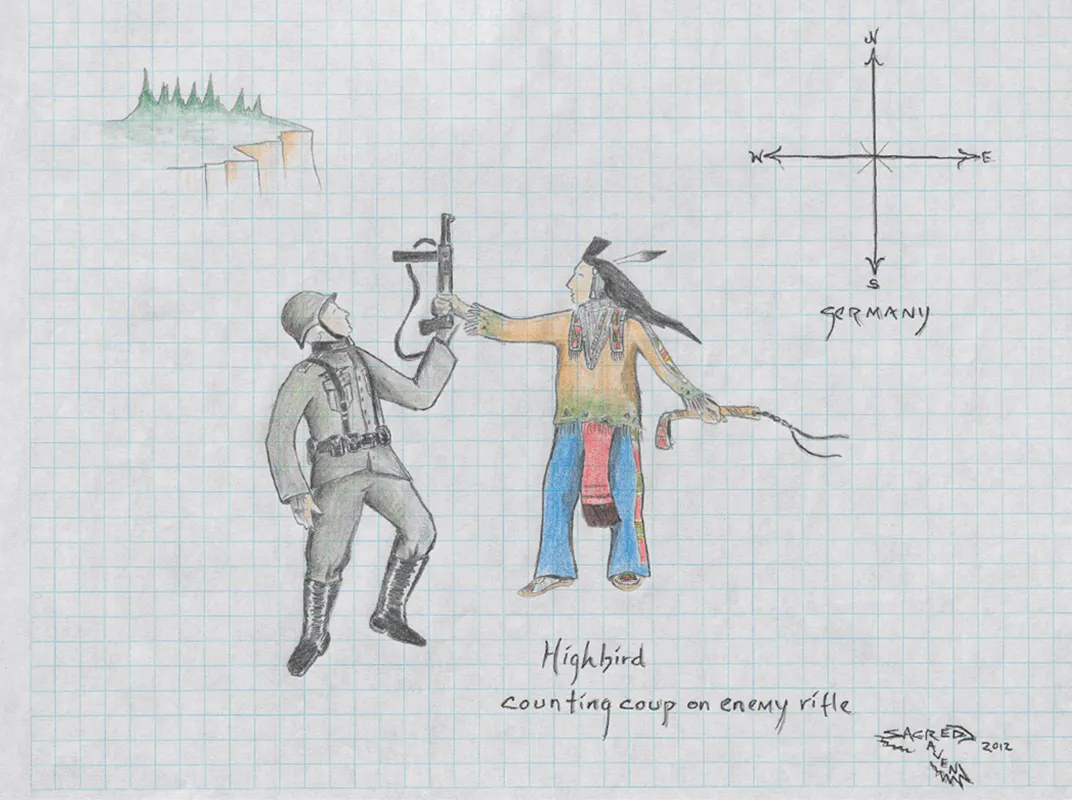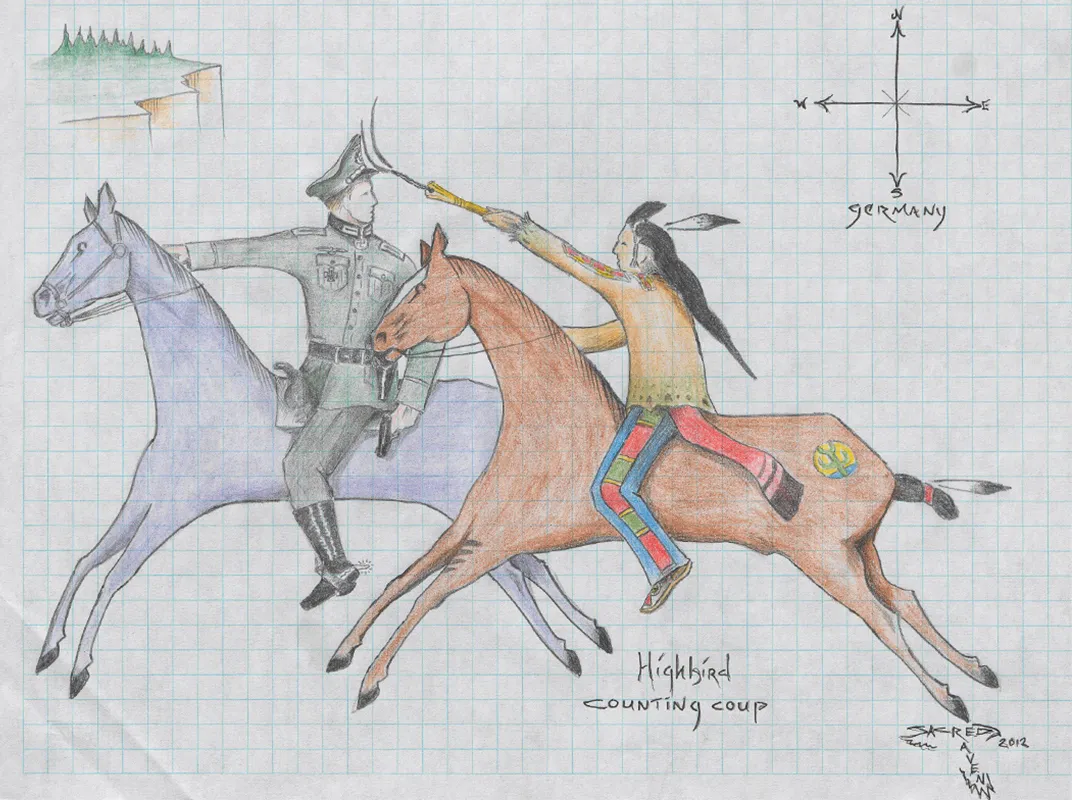Remembering Dr. Joe Medicine Crow
He showed us we are capable of great things when we look within ourselves, says scholar Nina Sanders
:focal(536x148:537x149)/https://tf-cmsv2-smithsonianmag-media.s3.amazonaws.com/filer/5d/62/5d627e7e-cbf9-432a-a8a2-74b6c4cf46ce/dscf1882-28-resize.jpg)
With incense burning and the singing of sacred songs, I came into this world. I was singing too, but they probably thought I was wailing.
Joe Medicine Crow’s death Sunday was reported by the Washington Post and the BBC; President Obama released a statement regarding his passing. He was an incredible man—a chief, scholar, advocate for Indigenous people, a recipient of the Presidential Medal of Freedom, a direct descendant of a celebrated chief, published historian, warrior, musician, and family man. The Apsáalooke (Crow) people mourn his loss but remember his remarkable life by telling personal accounts of how he touched all of our lives.
Dr. Joseph Medicine Crow (Baakkáa Dákaakaash) was a member of the Whistling Water clan (Bilikóoshe). The last Crow war chief, he was our teacher and grandfather. Joe was raised by our ancestors and thoughtfully reminded us of who they were and how the new generation continues to be part of the narrative. He taught us to embrace our identity by reminding us that our people are victors, not victims. When he spoke to us, he frequently reminded us of the splendor and relevance of Crow Country, what we came from and why the Apsáalooke people continuously persevered. He showed us we are capable of great things when we look within ourselves and draw strength from those who came before us.

Dr. Medicine Crow connected us to our heritage through his stories. He lovingly wove the Apsáalooke narrative into the historical western account. He made us part of history books. He showed us that Indian people and our stories are relevant. His work was immense and significant, yet he was jovial about it. It was evident in listening and speaking with him that he loved his work.
Joseph was attentive and articulate when he spoke to people, whether it was to a classroom full of Crow kids or the president of the United States. We were all made to feel as if his story was especially for us. He provided us vivid and magnificent images of Crow men fighting in battle. We were enthralled by his counting coup on a German soldier during World War II. He captured 50 head of horses and sang a Crow victory song as he rode away, leaving the enemy on foot. Crow children act out his accounts on the backs of ponies along the banks of the Little Bighorn River. We have all been captivated by the magnificence of his experiences. As adults, we read his books and listened to him speak at tribal events. We imagined ourselves the recipients of Master’s degrees and honorary doctorates. Through all of the phases of our lives, he encouraged us to be brave, to be better, to get educated, stand for what is right, and live a life of honor.

My grandmother Margo Real Bird told me that when Joe would visit other cities and countries, he would always return with a handful of pens and knick-knacks for his Real Bird sisters and aunties. She said he was thoughtful and he never forgot where he came from. He was my grandmother’s relative, both descendants of Chief Medicine Crow and his wives—Joe from Medicine Sheep and Margo from Takes Many Prisoners. They spoke to each other with the utmost respect and the occasional witticism. As a child, I saw him as one of my many grandfathers. He was always very kind and polite. He would glance down from his conversations with my grandmother and acknowledge me by asking my name and how I was doing. Sometimes he would pat my head and tell me to take good care of her. It wasn’t until my adult years that I fully understood the scope of his accomplishments. I read all of his books and listened to my grandfather Floyd, another Apsáalooke WWII veteran, talk about Medicine Crow’s coups on the Germans.
Like other Crows, as I learned about him and listened to him, I understood he was extraordinary. He inspired me to think that I, too, was capable of great things, that I could graduate from college, author books, and travel the world. In the winter of 2016, I graduated from Arizona State University with a degree in American Indian studies and anthropology. During my academic career I’ve cited his work, read and re-read his books; I made him part of my own narrative. His work compels me to continuously develop my knowledge concerning the Crow people and most importantly, to expand on our narrative in a way that honors Apsáalooke persistence. Joe Medicine Crow reminds me that I came from great people, we are brilliant and adaptable, and the work we do must serve the greater good.

Last month while I was at the National Anthropological Archives in Washington, D.C., I went through a large stack of photos of Crow people, and on the back of hundreds of those photographs there were handwritten notes identifying the name, place and person in just about every photo. The person that identified all of these individuals and places was Dr. Medicine Crow. I was humbled and filled with the utmost gratitude that he took the time to do this work so every Crow who followed him would know who and where we came from. I am still in awe that I was able to hold the same photographs and read the writings of Dr. Joe Medicine Crow. I certainly hope that the work I do will honor his legacy. He showed me it is important to be encouraging to those who follow us, to remind the people that they are always able to overcoming hardship and capable of honorable and wonderful things.
Aho, Grandpa Joe. You will be missed. And thank you for what you have done for our people. I know you will continue to look out for us from Other-Side Camp.